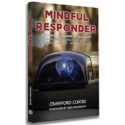What a time. Policing is stressful enough, and now this.
Cops everywhere are needing to deal with the nervous, pressurized public while simultaneously dealing with their own personal challenges that have been exacerbated by the coronavirus situation.
It’s not out of the realm of reason to believe that some of us may have thoughts of hopelessness. Hopefully, they’re fleeting thoughts, but notable and likely alarming, nonetheless.
 In the book, Mindful Responder: The First Responder’s Field Guide to Improved Resilience, Fulfillment, Presence & Fitness, published by Calibre Press and authored by Crawford Coates, you’ll find 9 things that can help you avoid falling prey to hopelessness.
In the book, Mindful Responder: The First Responder’s Field Guide to Improved Resilience, Fulfillment, Presence & Fitness, published by Calibre Press and authored by Crawford Coates, you’ll find 9 things that can help you avoid falling prey to hopelessness.
Here’s a summary:
1. Tap into strong social supports. As Coates points out, this means not just having many friends, but having friends you look up to who are themselves resilient. Watching strength, resilience and positive determination in action can be inspiring and contagious. Actively look for that and draw your own strength from it.
2. Help others. By virtue of your job, you’re helping others, but sometimes, the kind of “help” you provide as a cop doesn’t always feel like a positive thing. Look for opportunities to help others outside of the job, too. “Good deeds create positive emotions and engender a positive self-image in the long term,” says Coates. Being compassionate to others and seeing the results of helping someone in need, even if it’s just by sharing some positive thoughts in a tough time, has great emotional benefits for you as well. Research backs that up.
3. Maintain your sense of humor. Seriously. Stay funny. Cops can be some of the funniest people in the world, which can be hard for some to believe given what they deal with. Don’t overlook opportunities to laugh, even in the most trying situations. Sometimes (OK, many times) it may be gallows humor but it’s humor, and when it’s shared with those who get it, it helps. It’s important.
4. Stay proud. That means pride in what you do and who you are. “You are a first responder! There is great pride in that,” Coates reminds us. Your work is noble, courageous and critical…and so are you. Remember that and believe in your self-worth and extraordinary abilities in times when you might start feeling helpless or hopeless. You have tremendous reason to stand proud amid the storm. Take strength in that.
5. Accept the fact that mistakes happen. You can’t work in the public and deal with crisis and pain and confusion and violence and whatever else without making mistakes. Sometimes they’re painful. A key to preventing mistakes from pulling you into despair is forgiving yourself. Take a long-term look at life and then put the situations you’re currently facing into context, then motivate yourself to move on.
6. Keep fit. Exercise and diet are essential to mental and physical health. If you start feeling overwhelmed and you feel lethargy leaking in, don’t let it take over. Motivate yourself to keep active and make it a point to eat right. The physical and chemical benefits of that can be powerful weapons against feelings of hopelessness.
7. Rest up. Getting enough sleep can be one of the best things you can do to keep yourself strong emotionally. On the flip side, fatigue and lack of sleep can magnify negative feelings and tear away at some of the positive self-thinking we listed earlier. There are some good sleep tips listed in an earlier Calibre article posted here and many other resources online. Remember, too, that #6 will also help you sleep better.
8. Think small. Get through the manageable tasks in front of you rather than worrying about the big, scary picture. Stay focused and productive while avoiding the understandable but unadvisable temptation to look so far down the road – a road you can’t really see the end of anyway – you lose sight of your ability to make a difference right here, right now.
9. Be mindful & avoid the Three P’s. From Coates: “Take a deep belly breath and return in silence to your body. For all the reasons I’ve highlighted in this book—increased self-awareness, gratitude, sense of well-being, and situational awareness—mindfulness contributes to your ability to weather life’s ups and downs resiliently and see that life goes on despite setbacks.” That way, Coates points out, you can avoid falling into what prominent psychologist, Martin Seligman, called the Three P’s: personalization (it’s my fault); permanence (it will be this way forever); and pervasiveness (this affects all aspects of life). How you handle the Three P’s might determine how you come out on the other side of a trying, perhaps traumatic, experience. “A little bruised, but okay.”
Stay safe. Stay healthy. Stay strong.










0 Comments